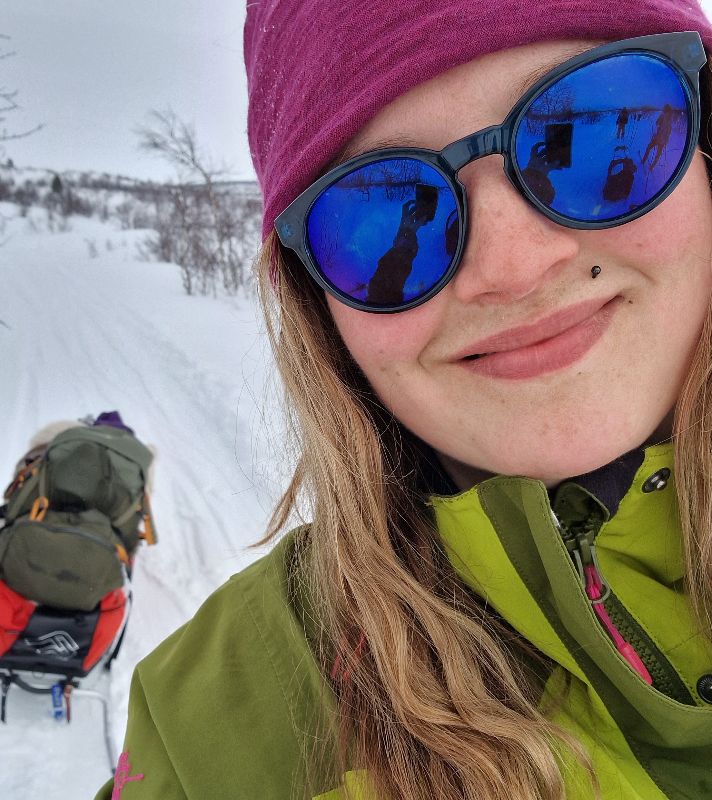Nature and wilderness guide
"The work of a wilderness guide is seasonal. I long to spend time outdoors, and I want to enjoy all seasons as much as possible. The work requires good interaction skills and knowledge of local culture. The guide must have a good self-knowledge to understand their own skills, limits and strengths. The profession also requires good English skills. Various other languages are also an advantage."

- Anna-Leena Nordberg
- Works as a nature and wilderness guide under her own business name, doing subcontracting for White Adventure, among others.
- Qualified as a nature and wilderness guide from Lappia Vocational College and as a drama and theatre instructor from Central Ostrobothnia University of Applied Sciences. Graduated with a Bachelor of Science degree in Sociology from Lapland University of Applied Sciences.
- 10 years of work experience in the field.
Briefly explain what you do for a living.
In winter, I work as a wilderness guide. I prepare and implement the programme included in hiking tour products. I’m in charge of the comfort and safety of the group taking the tour. I have two main products. The first one is the week-long Silence & Nature Tour. It takes people to nature in groups of up to six people without motor vehicles. The second product is a five-day ski hike for up to four people. The wilderness guide's work is mostly customer service, and the working language is English. Since local, socially and ecologically sustainable food is an essential part of hiking products, cooking constitutes a major share of the work. Because I work as a subcontractor, my job description does not include marketing or customer acquisition.
I have also developed a product intended for work communities. It allows me to utilise both my theatre expression and nature and wilderness guide training. I organise excursions for working groups where we walk or ski, prepare food over an open fire, familiarise ourselves with a nature-related theme and do drama exercises. I also train other guides in interaction and presentation skills. In other words, my work is very diverse, and I can use the competence I have acquired through all my different qualifications.
How have you ended up in the profession of your choice?
I long to spend time outdoors, and I want to enjoy all seasons as much as possible. I had dreamed about going to nature and wilderness guide school for a long time. When I finally managed to arrange my life so that I could study there, it gave me a chance to live one of the best years of my life. In my work, I want to make it possible for others to deepen their connection to nature.
Describe your typical working day or week.
The work of a wilderness guide is seasonal. In winter, I may work for a week and then have two weeks off. Before an excursion, it takes me one day to prepare the tour. And when the customers have left, it takes me half a day to service the equipment.
What kind of work environment or working hours do you have?
The one-week trip is always very intense. One half of the week, I accompany the group from morning to evening, as I also spend a couple of nights sleeping with them at a wilderness hut with no electricity or running water. On a ski hike, I spend four nights in a tent.
What kind of competence or qualities are required in the profession?
First and foremost, a nature and wilderness guide must be familiar with nature. They must be able to orientate themselves, use a map, compass and map applications, and give first aid. Working in nature requires flexibility and adaptability. In addition, one must have good cold tolerance.
The work requires good interaction skills and knowledge of local culture. The guide must have a good self-knowledge to understand their own skills, limits and strengths. The profession also requires good English skills. Various other languages are also an advantage.
What is the best thing about your profession?
Spending time outdoors in the silence of nature, as we do not use motorised vehicles. Peace and purity are important to me.
What are the downsides of the profession or what seems challenging?
Seasonal nature. In addition, the work is low-paid and thus not very economically attractive.
What would you tell a person considering the profession of a nature and wilderness guide?
At first, it is a good idea to acquire one year's nature and wilderness guide training. After that, you should boldly start designing products based on your own expertise and strengths. At first, you can act as a part-time entrepreneur.
How do you see the future of your profession?
It is easy to combine the work of a nature and wilderness guide with other professions. In my opinion, there is potential for utilising the competence acquired in this work in, for example, the social and educational sectors.
